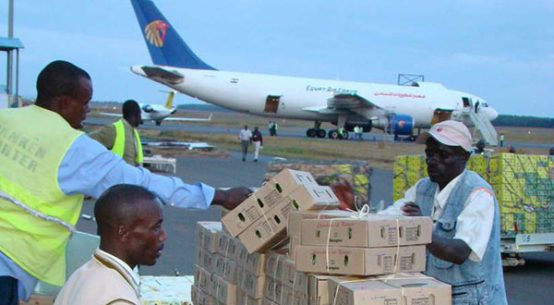
The main purpose of the AEO status is to improve security on external borders
Authorised Economic Operator (AEO) programme will facilitate local stakeholders participation in global trade
Lagos – The Nigeria Customs Service has announced that it will introduce the Authorised Economic Operator (AEO) programme to check the menace of smuggling, especially the influx of illegal arms and other contraband goods into the country through the ports.
The AEO is a programme introduced by the World Customs Organisation in conjunction with National Customs Administration to facilitate safe and secure trade across the international border.
This was revealed by the Deputy Comptroller General of Customs on Strategic Research and Planning, Patience Iferi at a one-day sensitization workshop in the Apapa Command of the NCS, where he represented the service’s Comptroller General, Col. Hameed Ali, (retd.).
According to the World Customs Organization (WCO), an authorized economic operator (AEO) is
“a party involved in the international movement of goods in whatever function that has been approved by or on behalf of a national Customs administration as complying with WCO or equivalent supply chain security standards. Authorized Economic Operators include inter alia manufacturers, importers, exporters, brokers, carriers, consolidators, intermediaries, ports, airports, terminal operators, integrated operators, warehouses and distributors”
The growth of global trade and increasing security threats to the international movement of goods have forced customs administrations to shift their focus more and more to securing the international trade flow and away from the traditional task of collecting customs duties. Recognizing these developments, the WCO, drafted the WCO Framework of Standards to Secure and Facilitate global trade (SAFE). In the framework, several standards are included that can assist Customs administrations in meeting these new challenges. Developing an Authorized Economic Operator programme is a core part of SAFE.
The main purpose of the AEO status is to improve security on external borders of the Union and at the same time to speed up the movement of goods through the simplified customs procedures and use of the information technology. AEO status provides economic operators, who meet the conditions and criteria, with benefits in the form of facilitation of the customs controls in terms of safety and security and/or simplifications in accordance with the customs law and provisions. AEO certificate holders are given certain priorities over other traders.
Nigeria customs plans to involve all stakeholders in the AEO programme in order facilitate global trade as being carried out in other parts of the world as it will help stakeholders to trade internationally rather than being limited to local trade.
According to customs CG, “if Uganda, a very small country in terms of population and size, can celebrate and embrace the AEO, why should Nigeria, the giant of Africa, not boast of the AEO?”
Also speaking, the AEO team Leader for Zone A, Mark Lina, noted that the increase in the volume of trade among countries and the changing trends in supply chain made it imperative for Customs administration to review the role of the body in international trade and sensitize the business community to the need for the AEO.
Lina urged the stakeholders to be trustworthy and transparent as this was the major requirement to becoming an AEO operator.
Other requirements, according to the team leader, include being an economic operator and part of the supply chain, having a record of compliance with Customs legislation and taxation rules and having no record of serious criminal offenses relating to economic activities.
“In addition to these, the applicant must have operated in the country for three years and above without any problem with the relevant authorities in the country,” Lina said.
With additional reports from Punch








